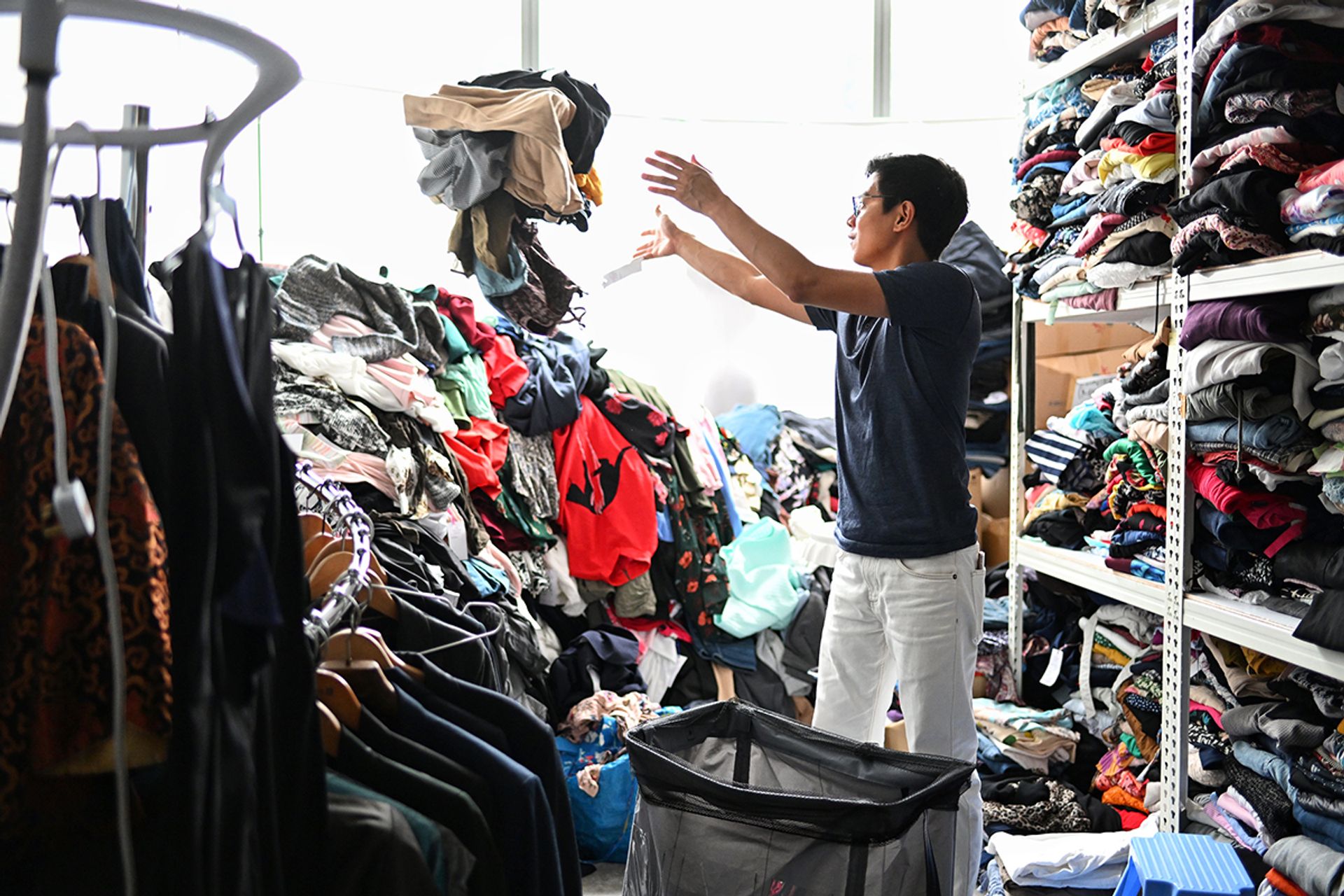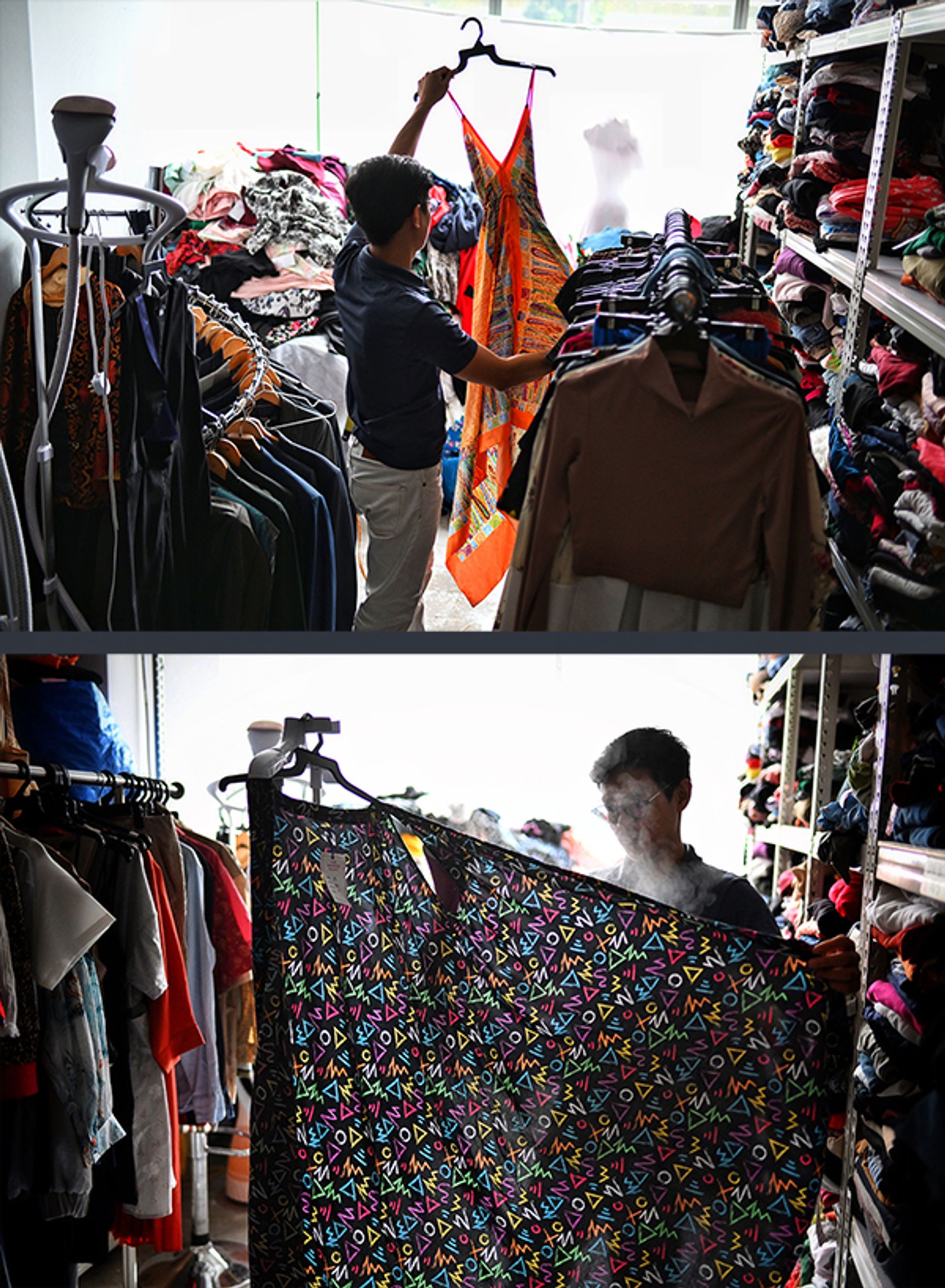In preparation for a competition she took part in recently, Ms Lizzy Homersham wanted to get herself a new outfit.
But instead of hitting the mall, the 32-year-old video producer approached Mr Raye Padit (right), founder and chief executive of The Fashion Pulpit, to customise an outfit upcycled from old, unwanted clothing.
The Fashion Pulpit is a boutique specialising in preloved apparel. It is located at OUE Downtown Gallery in Shenton Way.
The competition, titled Art Of Trash, received more than 190 entries from participants getting creative with upcycling trash into art.
“I wanted an outfit that was sustainable to suit the overall theme of the event, but also something practical which I could still wear on other occasions,” said Ms Homersham.

She went through the designs and materials with Mr Padit, and waited as he made adjustments to her top during a fitting session on March 8.

The result?
An outfit comprising a skirt with a vibrant, patchwork art design – stitched together from old cheongsams and brightly printed clothing – and a simple white top jazzed up with appliques of matching prints.

Her entry came in second in the competition.
The Fashion Pulpit has created more than 100 bespoke outfits, ranging from wrap skirts to vests made from old denim jeans.

“We wanted to introduce customised upcycled clothing to reach a wider segment of customers, after some shared that they were not comfortable buying second-hand, but did not mind an upcycled outfit made from their old clothes,” said Mr Padit.

This is just one of the few strategies employed by the company to prolong the lifespan of clothes, and reduce the scale of textile waste in Singapore.

Textile waste here reached a staggering 189,000 tonnes in 2021, 96 per cent of which was incinerated, according to the latest figures from the National Environment Agency.
Wanting to deal with this burgeoning problem in an innovative way, Mr Padit, who was previously a fashion designer, set up The Fashion Pulpit in 2018 to promote a culture of clothes swopping, so that consumers could refresh their wardrobes in a sustainable way.
SUSTAINABLE FASHION
Customers pay a membership fee, which starts from $35 for a one-time swop of up to eight items of clothing.
Other membership tiers include two months, six months, and one year, with the latter two tiers allowing customers to swop an unlimited number of clothing over the course of their membership.
They can then collect points to redeem from racks of pristine-looking, second-hand pieces. Points are allocated to the clothes based on their style, quality, brand, and how “swoppable” they are.
Every fortnight, these racks undergo a revamp, with staff working frantically on Mondays to replace the existing items with new ones.

Some of these clothes were displayed previously, but ended up not being picked by customers. About 99 per cent of the store’s inventory comes from its members, while the rest is donated by brands from their past collections.
The next day, at 11am sharp, enthusiastic customers come armed with bags full of old clothes for swopping, to get first dibs on what the boutique has to offer.
Ms Sarah Moore, 41, makes it a habit to come to The Fashion Pulpit whenever she gets tired of her existing clothes and feels like she needs new ones.

The teacher at the Australian International School said that swopping has made her a lot more conscious and intentional when purchasing new items of clothing.
When ST met her, she had brought along two friends, to introduce them to the swopping experience.
GAINING POPULARITY
Such word-of-mouth referrals have helped Mr Padit build the boutique’s membership base from 300 members in 2018 to more than 6,000 in 2022.
Old clothes that have not found new homes are sold at a quarterly thrift event known as Playdate.

Shoppers can purchase $18 tickets to buy five articles of clothing, or $48 tickets for 20 pieces.
Consultant Tiffany Lee (below, left), 30, and her friend, Ms Doreen Ang, 34, are constantly on the hunt for such thrift events to attend together.

“Women like to buy new clothes but it comes at a high cost to the environment and also to our pockets,” said Ms Ang, a business development manager.

The pair also frequently swop clothes with each other, after meeting through Carousell some years ago and discovering that they shared similar taste in clothes and even clothing size.

Since it was launched in 2018, The Fashion Pulpit has saved more than 10,000kg of clothing from being incinerated, according to its sustainability report published in December 2022.

While this may seem like a mere drop in the ocean, it is the act of helping consumers develop a healthier relationship with their clothes that is making waves among shoppers here, said Mr Padit.

He added: “It is important for us to know how our clothes are made, the materials needed to make them, and to recognise the people who make them, too. This way, we will buy better, take care of the things we own and, ultimately, our environment through a deeper understanding of where we get our resources from.”
WHERE CAN I SHOP SUSTAINABLY?
1. Carousell
From Lululemon tights to Love Bonito workwear, the app has everything and anything you could imagine, some of which are brand new and never worn before
2. Style Theory
Rent instead of buy, especially for outfits which you might only wear on occasion or if you’re just experimenting with a new style
3. Flea Markets
Events such as The Hammock Market and The Luggage Market at the Aperia Mall features a wide range of clothing, both pre-loved and sourced from thrift stores
4. The Fashion Pulpit
Membership starts at $35 for a one-time exchange of up to eight items at this boutique. The store also has two-month, six-month and year-long memberships for regular swappers

5. Upcycle Your Old Clothes
Be creative: you can cut, sew, repurpose, and re-style some of your pre-loved items instead of throwing them away


